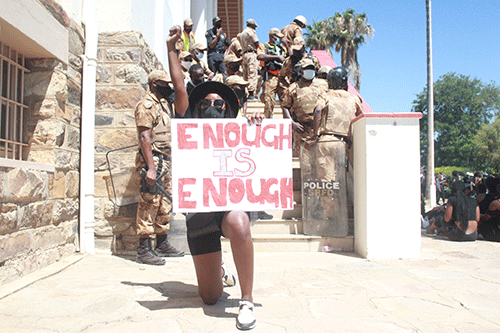Kuzeeko Tjitemisa
Maria Amakali
An alarming number of rape cases has forced the justice ministry to amend the country’s combating of rape law, which would see perpetrators receive stiffer sentences.
The Bill, which was tabled in parliament on Tuesday by justice minister Yvonne Dausab, seeks to tighten the country’s rape laws, making sure that “rape has no place in our communities, in our homes or anywhere else in our country”.
According to the Namibian police statistics, 690 rape cases were reported between January and August last year.
Motivating the Bill, Dausab asked fellow lawmakers to support the amendments to demonstrate the country’s collectiveness in resolving gender-based violence (GBV), which has a disproportionate impact on women and girls.
Furthermore, it would help curb the increasing number of sexual violence cases in the country.
The Bill proposes an increase in the sentences imposed on first time rape offenders from a minimum of five years to 10 years imprisonment.
However, repeated rape offenders face jail time of up to 20 years and not 10 years as it currently stands.
The sentences increase depending on the circumstances surrounding the offence. For rape committed under coercive circumstances, perpetrators will now receive a minimum prison term of 15 years and not 10 years as it was before.
Those convicted of rape where the victim suffered grievous bodily harm, mental harm and where the victim is under the age of 13, the perpetrator faces up to 20 years imprisonment and not a minimum of 15 years.
Dausab said statistics show harsh and lengthy imprisonment sentences do not necessarily serve as deterrence for would-be offenders but it mitigates the impact. “We should ensure as lawmakers that where an accused is convicted of rape, especially under coercive circumstances, he/she faces the full wrath of the law. As a nation, we should continue to find ways to prevent the increasing occurrence of rape and focus on rehabilitation of convicted offenders,” she said.
The Bill also provides an additional ground for coercive circumstance for rape, which would include but is not limited to the abuse of power or authority, where the person in respect of whom the sexual act is committed is inhibited from indicating his or her resistance to that act or their unwillingness to participate in that act.
Dausab noted this would be in addition to the existing nine grounds such as the application of physical force, threats, unlawful detainment and age of the complainant, as listed in section 2(2) of the Combating of Rape Act, 2000.
The amendments will now include exceptionally vulnerable complainants referred to in the Combating of Rape Act, 2000 and will include persons with mental or physical disabilities and any other reasons.
Human rights activist Ndiilo Nthengwe said the proposed amendments take cognisance of the prevalence of rape in Namibia, specifically, rape culture and the many ways victims and survivors are affected.
“The emphasis is on a victim-centred approach Bill, it means that it will not only send a strong message to predators on the seriousness of this crime, but to victims that their cases will be taken even more serious,” said Nthengwe.
She added what is important is the application and enforcement in order to determine the impact it would have.
mamakali@nepc.com.na


